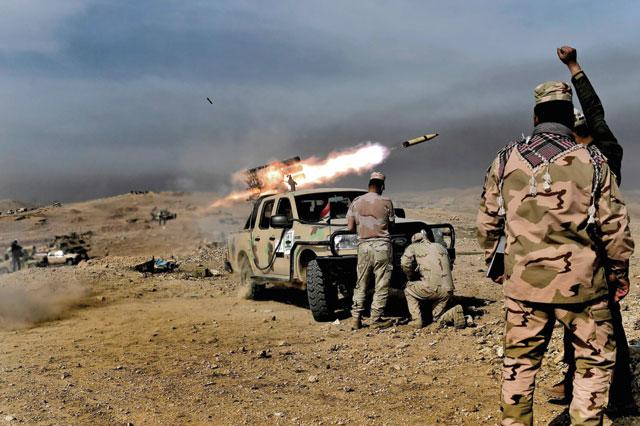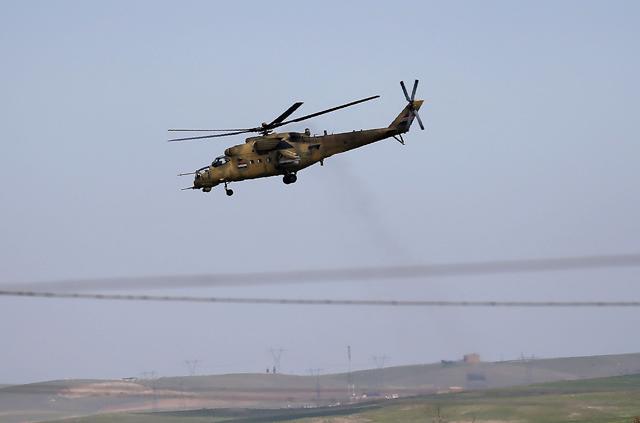You are here
Iraq forces reach key Mosul bridge
By AFP - Feb 27,2017 - Last updated at Feb 27,2017

Members of the Iraqi army’s 9th Division fire a multiple rocket launcher from a hill in Talul Al Atshana, on the southwestern outskirts of Mosul, on Monday, during an offensive to retake the city from Daesh extremists (AFP photo)
SOUTH OF MOSUL — Iraqi forces battling the Daesh terror group in west Mosul reached the city's southernmost bridge Monday, a key step in efforts to defeat the extremists in their stronghold, a spokesman said.
The move, a little more than a week into a major push on Mosul's west bank, could allow Iraqi forces to extend a floating bridge between the city's two halves and pile pressure on the extremists.
"The Rapid Response force and the federal police have liberated Jawsaq neighbourhood and now control the western end of the fourth bridge," Brigadier General Yahya Rasool told AFP.
The spokesman for the Joint Operations Command was referring to the southernmost of five bridges — all of which are damaged and unusable — across the Tigris River that divides the northern Iraqi city.
"That means the bridge is under control on both sides," said Rasool.
Government forces retook the east bank from Daesh a month ago, completing a key phase in an offensive on Mosul that began on October 17 and has involved tens of thousands of fighters.
Engineering units will be expected to deploy a so-called "ribbon bridge" across the Tigris that will allow the connection of the western side's active frontlines to the already retaken east bank.
Rasool said that the interior ministry’s Rapid Response force had now fully retaken two neighbourhoods on the west bank, while forces from the elite Counter-Terrorism Service have retaken another further west.
“The street fighting is intense, these are populated neighbourhoods,” Rasool said. “But our forces are fighting deep in the west, the enemy is broken.”
Desert advance
Iraq forces were also retaking desert territory southwest of the city in order to further cut off Mosul from Daesh-held territory in Syria.
“In general, all the troops are moving forward as planned and doing so rapidly,” Staff Lieutenant General Abdelamir Yarallah told AFP from Talul Al Atshana, the highest point in the Nineveh province, of which Mosul is the capital.
Nearly a month after wresting back full control of the city’s east bank from the extremists, Iraqi forces launched a fresh push on the western side, which is a little smaller but very densely populated.
They made quick initial gains, blitzing through the last open areas south of the city limits, facing limited resistance from Daesh as they retook the airport and a nearby military base.
Daesh militants have hunkered down deep inside the city, and while Iraqi forces are still advancing steadily, the battle is expected to get tougher the farther they venture towards the centre.
Iraqi aviation helicopters and air strikes by the US-led coalition have played a key role in the latest progress, but the density of the civilian population inside the city will limit air support.
The west bank of Mosul includes the Old City, where Abu Bakr Al Baghdadi made his only public appearance in July 2014 and proclaimed a “caliphate” straddling Iraq and Syria.
Some of its streets are too narrow for military vehicles and will oblige Iraqi forces to undertake perilous dismounted operations.
What the militants still hold of Mosul is their last major urban bastion in Iraq, and its recapture would crown more than two years of a bloody counteroffensive to retake the third of the country it lost to Daesh in 2014.
Starvation risk
Daesh’s”caliphate” has shrunk to a rump, but it still controls the Syrian city of Raqqa and remote, scattered pockets of territory in both countries.
The fighting in Mosul’s west bank has raised concerns about the fate of the estimated 750,000 or more people trapped there with dwindling food supplies and little or no access to health services.
The United Nations’ food agency said accounts by recently displaced people it was helping were very alarming.
“We are hearing from some families that food has drastically risen in price and is unaffordable. In extreme cases, people cannot access food at all,” the WFP’s Iraq chief Sally Haydock said.
The Norwegian Refugee Council said on Sunday it had received reports that some people were surviving on bird feed.
The UN has said it was planning for a possible exodus of 250,000 people or more from west Mosul.
Yet only a few hundred families have fled their homes as Iraqi forces retook their neighbourhoods over the past week.
Some are unable to leave because Daesh uses them as human shields, while others decide against exposing themselves to cross fire or leaving their property unprotected.
Some residents may also be Daesh supporters willing to help militants in their last stand or afraid to face arrest if they leave.
Related Articles
MOSUL — Iraqi forces battled extremists in west Mosul Sunday, aiming to build a floating bridge across the Tigris to establish an important
ERBIL, Iraq — The Daesh terror group shot down an Iraqi helicopter operating over Mosul on Thursday, as security forces announced they recap
KIRKUK, Iraq — Iraqi forces launched an operation on Tuesday to retake a northern town from the Daesh terror group in the latest move to pre

















